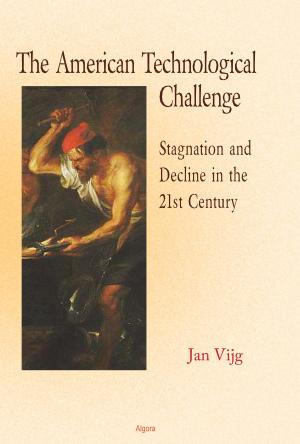Alexander Hamilton
America's Forgotten Founder
Nonfiction, History, Americas, United States, Revolutionary Period (1775-1800)| Author: | Joseph A. Murray | ISBN: | 9780875865027 |
| Publisher: | Algora Publishing | Publication: | December 15, 2009 |
| Imprint: | Algora Publishing | Language: | English |
| Author: | Joseph A. Murray |
| ISBN: | 9780875865027 |
| Publisher: | Algora Publishing |
| Publication: | December 15, 2009 |
| Imprint: | Algora Publishing |
| Language: | English |
Alexander Hamilton: Americas Forgotten Founder describes the character and achievements of a man who was instrumental in casting the form of our government and especially its strong financial structure. His financial innovations renewed the public credit when war debts threatened to swamp the fledgling economy, provided a stable currency system and established a federal revenue system. Hamilton s involvement in the foreign affairs of the new republic assured its unity, sovereignty and rapid economic growth.
Born in the West Indies, Alexander Hamilton migrated to America when he was fifteen years old, at a time when Colonial America was torn by political unrest with Great Britain. He served in the Revolution as General Washington s chief aide-de-camp and as an officer in combat units. He was a persuasive presence in the Constitutional Convention and helped to lead the subsequent ratification process.
Hamilton was a proponent for a strong central government, believing that its direct influence over the people would strengthen the unity of the country. As Secretary of the Treasury, he understood that a strong financial system was essential to provide credibility and economic growth to the new republic. He based his financial plan on the consolidation of the national debt and the adoption of a taxation system to service and retire that debt. He promoted the chartering of the Bank of the United States as the keystone to his financial plan.
Arguably the Father of Federalism, Hamilton gave more to the structure and process of the United States government then any other single individual. His opponents, principally the Jeffersonian Republicans, argued for greater sovereignty for state governments and sought to diminish the role of wealth in structuring and operating the financial systems of the country. When it came, the Civil War vindicated Hamilton s politics over Jefferson s view of a more tenuous and tentative union.
He authored the lion s share of The Federalist Papers, writings which remain an important guide to the meaning and the intended function of the Constitution today.
Regrettably, the hostility of his political opponents has transcended the country s recognition of the debt owed to this man.
This work introduces the general reader to some of the challenges and controversies of the early days of the Republic and highlights Hamilton s brilliant contributions to US policy and structure. Hamilton promoted a vigorous national government to create a strong and unified country out of a mixed bag of 13 sovereign states.
This book was written for the broad cross-section of American readers, particularly those who, while not having an abiding interest in history, would welcome an interestingly written, brief history of Hamilton s life and the great events surrounding the founding of the nation. The book is also suited for high school and college-level students of US history. Most Americans today have little understanding of the character, the life and accomplishments of Alexander Hamilton, an extraordinary man by any account and an extraordinary American. The current work intends to make his life and accomplishments accessible to a broader public.
Alexander Hamilton: Americas Forgotten Founder describes the character and achievements of a man who was instrumental in casting the form of our government and especially its strong financial structure. His financial innovations renewed the public credit when war debts threatened to swamp the fledgling economy, provided a stable currency system and established a federal revenue system. Hamilton s involvement in the foreign affairs of the new republic assured its unity, sovereignty and rapid economic growth.
Born in the West Indies, Alexander Hamilton migrated to America when he was fifteen years old, at a time when Colonial America was torn by political unrest with Great Britain. He served in the Revolution as General Washington s chief aide-de-camp and as an officer in combat units. He was a persuasive presence in the Constitutional Convention and helped to lead the subsequent ratification process.
Hamilton was a proponent for a strong central government, believing that its direct influence over the people would strengthen the unity of the country. As Secretary of the Treasury, he understood that a strong financial system was essential to provide credibility and economic growth to the new republic. He based his financial plan on the consolidation of the national debt and the adoption of a taxation system to service and retire that debt. He promoted the chartering of the Bank of the United States as the keystone to his financial plan.
Arguably the Father of Federalism, Hamilton gave more to the structure and process of the United States government then any other single individual. His opponents, principally the Jeffersonian Republicans, argued for greater sovereignty for state governments and sought to diminish the role of wealth in structuring and operating the financial systems of the country. When it came, the Civil War vindicated Hamilton s politics over Jefferson s view of a more tenuous and tentative union.
He authored the lion s share of The Federalist Papers, writings which remain an important guide to the meaning and the intended function of the Constitution today.
Regrettably, the hostility of his political opponents has transcended the country s recognition of the debt owed to this man.
This work introduces the general reader to some of the challenges and controversies of the early days of the Republic and highlights Hamilton s brilliant contributions to US policy and structure. Hamilton promoted a vigorous national government to create a strong and unified country out of a mixed bag of 13 sovereign states.
This book was written for the broad cross-section of American readers, particularly those who, while not having an abiding interest in history, would welcome an interestingly written, brief history of Hamilton s life and the great events surrounding the founding of the nation. The book is also suited for high school and college-level students of US history. Most Americans today have little understanding of the character, the life and accomplishments of Alexander Hamilton, an extraordinary man by any account and an extraordinary American. The current work intends to make his life and accomplishments accessible to a broader public.















